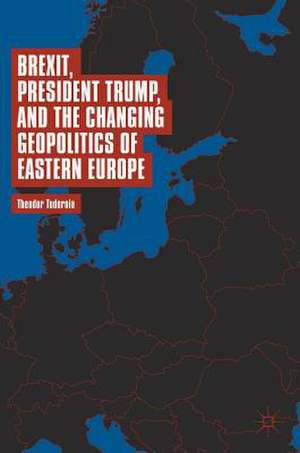Brexit, President Trump, and the Changing Geopolitics of Eastern Europe
Autor Theodor Tudoroiuen Limba Engleză Hardback – 20 apr 2018
| Toate formatele și edițiile | Preț | Express |
|---|---|---|
| Paperback (1) | 724.63 lei 6-8 săpt. | |
| Springer International Publishing – 10 ian 2019 | 724.63 lei 6-8 săpt. | |
| Hardback (1) | 1002.13 lei 6-8 săpt. | |
| Springer International Publishing – 20 apr 2018 | 1002.13 lei 6-8 săpt. |
Preț: 1002.13 lei
Preț vechi: 1222.11 lei
-18% Nou
Puncte Express: 1503
Preț estimativ în valută:
191.82€ • 208.43$ • 161.23£
191.82€ • 208.43$ • 161.23£
Carte tipărită la comandă
Livrare economică 21 aprilie-05 mai
Preluare comenzi: 021 569.72.76
Specificații
ISBN-13: 9783319779195
ISBN-10: 3319779192
Pagini: 306
Ilustrații: VII, 291 p.
Dimensiuni: 148 x 210 mm
Greutate: 0.51 kg
Ediția:1st ed. 2018
Editura: Springer International Publishing
Colecția Palgrave Macmillan
Locul publicării:Cham, Switzerland
ISBN-10: 3319779192
Pagini: 306
Ilustrații: VII, 291 p.
Dimensiuni: 148 x 210 mm
Greutate: 0.51 kg
Ediția:1st ed. 2018
Editura: Springer International Publishing
Colecția Palgrave Macmillan
Locul publicării:Cham, Switzerland
Cuprins
Chapter 1 Introduction.- Chapter 2 Geopolitical Approaches, Regional Security Complexes, and Political Psychology.- Chapter 3 East European Interactions: Russian Foreign Policy as Structural Constraint.- Chapter 4 The European Union and Eastern Europe before and after Brexit.- Chapter 5 The United States and Eastern Europe.- Chapter 6 Europe's Great Powers and Small States.- Chapter 7 Domestic and Geopolitical Factors: Moldova as a CIS Case Study.- Chapter 8 Concluding Scenarios.
Notă biografică
Theodor Tudoroiu is Senior Lecturer at the Department of Political Science of the University of the West Indies at St. Augustine, Trinidad and Tobago. He works mainly on subjects related to post-communist and Middle Eastern regional politics and regime change.
Textul de pe ultima copertă
This book analyzes the combined consequences of Brexit and of the new US foreign policy under President Trump on the geopolitical situation of Eastern Europe. It perceives the evolution of the East European regional security complex as a struggle between the European Union's Kantian, win-win geopolitical vision and Russia's neoclassical geopolitics, also promoted by President Trump. In the most probable scenario, the latter approach will have the upper hand. The EU's post-Brexit control by the Franco-German axis will likely be followed by the geopolitical irrelevance of the EU due to the renationalization of member states' foreign policy, with Germany becoming the main West European actor. Consequently, Eastern Europe will be turned into the arena of a mainly three-cornered neoclassical geopolitics rivalry opposing Russia, the Franco-German axis and then Germany, and the US in alliance with the post-Brexit UK and certain East European states. The book will appeal to scholars across thefields of International Relations, Geopolitics, European Studies, and Area Studies.
Caracteristici
Provides the first book-length study of the effects of Brexit and Trump on the geopolitics of Eastern Europe Moves beyond the purely geopolitical by considering the domestic dimension of interactions between domestic and international actors Examines the re-assertion of Russian dominance over the domestic politics of East European States
